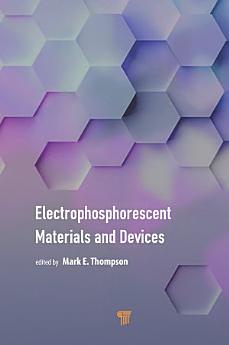Electrophosphorescent Materials and Devices
Mark Thompson
ທ.ວ. 2023 · CRC Press
ປຶ້ມອີບຸກ
1112
ໜ້າ
family_home
ມີສິດ
info
reportບໍ່ໄດ້ຢັ້ງຢືນການຈັດອັນດັບ ແລະ ຄຳຕິຊົມ ສຶກສາເພີ່ມເຕີມ
ກ່ຽວກັບປຶ້ມ e-book ນີ້
Organic LEDs (OLEDs) in mobile displays have been in large-scale production for over a decade, and OLED-based televisions are rapidly gaining traction in the marketplace. OLEDs are on the verge of entering the solid-state lighting market in a big way. The OLED technology gives higher color purity and is more efficient than any of the competing technologies. When produced at scale, OLEDs are also economical. A key limitation in the development of OLEDs was the efficient conversion of all of the electrical energy put into the device into light. Until the late 1990s, the maximum efficiency of OLEDs was limited to 25% (photons/electrons), but this limitation was removed and OLEDs with 100% efficiency were reported in the early 2000s. This advance in OLED technology was driven by the author of this book. He and his collaborators developed electrophosphorescence, which is essential in reaching the 100% efficiency that is now commonplace in commercial devices.
ກ່ຽວກັບຜູ້ຂຽນ
Mark E. Thompson received his BS in chemistry in 1980 from the University of California, Berkeley, and his PhD in chemistry in 1985 from the California Institute of Technology. He was a postdoctoral fellow at Oxford University and is currently the Ray R. Irani Chair of Chemistry at the University of Southern California. His research involves the study of materials and devices for electroluminescence, photovoltaics and solar cells, chemical/biological sensing, and catalysis. Prof. Thompson is the author of approximately 400 papers in refereed professional journals and holds more than 250 patents primarily in the areas of optoelectronic applications, such as light-emitting devices and solar cells.
ໃຫ້ຄະແນນ e-book ນີ້
ບອກພວກເຮົາວ່າທ່ານຄິດແນວໃດ.
ອ່ານຂໍ້ມູນຂ່າວສານ
ສະມາດໂຟນ ແລະ ແທັບເລັດ
ຕິດຕັ້ງ ແອັບ Google Play Books ສຳລັບ Android ແລະ iPad/iPhone. ມັນຊິ້ງຂໍ້ມູນໂດຍອັດຕະໂນມັດກັບບັນຊີຂອງທ່ານ ແລະ ອະນຸຍາດໃຫ້ທ່ານອ່ານທາງອອນລາຍ ຫຼື ແບບອອບລາຍໄດ້ ບໍ່ວ່າທ່ານຈະຢູ່ໃສ.
ແລັບທັອບ ແລະ ຄອມພິວເຕີ
ທ່ານສາມາດຟັງປຶ້ມສຽງທີ່ຊື້ໃນ Google Play ໂດຍໃຊ້ໂປຣແກຣມທ່ອງເວັບຂອງຄອມພິວເຕີຂອງທ່ານໄດ້.
eReaders ແລະອຸປະກອນອື່ນໆ
ເພື່ອອ່ານໃນອຸປະກອນ e-ink ເຊັ່ນ: Kobo eReader, ທ່ານຈຳເປັນຕ້ອງດາວໂຫຼດໄຟລ໌ ແລະ ໂອນຍ້າຍມັນໄປໃສ່ອຸປະກອນຂອງທ່ານກ່ອນ. ປະຕິບັດຕາມຄຳແນະນຳລະອຽດຂອງ ສູນຊ່ວຍເຫຼືອ ເພື່ອໂອນຍ້າຍໄຟລ໌ໄໃສ່ eReader ທີ່ຮອງຮັບ.








